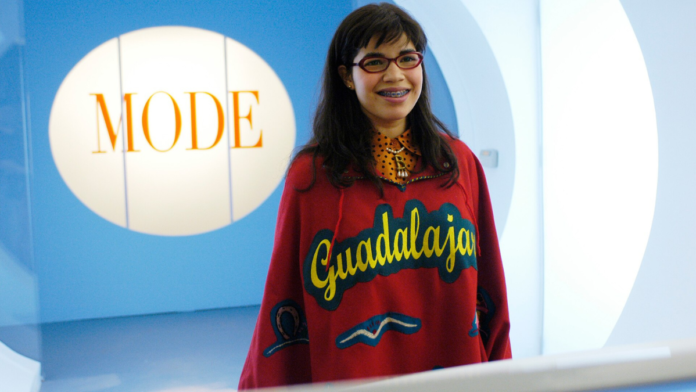As a nerdy girl with glasses who didn’t know how to manage her curly hair, Ugly Betty was a comfort show for me. Growing up, I was never the pretty girl, and I accepted that. I had my books, my smarts – I could be funny on occasion – and that had to be enough. Even when I became more interested in fashion and wanted to experiment more with my style, I was so insecure because I was so consumed with how I would be perceived. Watching Betty (America Ferrera) be unapologetically herself on screen helped me be kinder to myself, and to see myself beyond a world eager to tear me down with harsh words and opinions.
Ugly Betty isn’t idealistic enough to purport that appearance doesn’t make a difference – that first episode is brutal, having to watch Betty be treated horribly just because she doesn’t fit conventional beauty standards. But watching Betty Suarez develop her sense of self and confidence through the seasons was uplifting. Through it all, Betty doesn’t dilute herself to fit in, and eventually, everyone at Mode acknowledges what an asset she is, and her departure is viewed as a loss for the magazine.
In the show, though Betty had plenty of screw-ups, she was always capable. She had her own unique sense of style and just rolls with it, and even when her appearance slowly improves later on, it’s done gradually and on Betty’s own terms. She continues to wear glasses all the way until the end because that’s what she prefers.
Betty’s romantic relationships develop organically, and these men adore her. Interestingly, time did change how I perceived her love interests. I loved Henry (Christopher Gorham) when the show first aired – I mean, can you blame me? He’s an adorable nerd, they had shared interests, and his idea of a perfect date night is homemade ice cream and a movie – sounds ideal to me. Upon rewatch, I didn’t like him as much. Yes, Hilda (Ana Ortiz) not passing Henry’s message to Betty did impact their relationship quite a fair bit, but after he learns Betty is single, he chooses to swan about with Charlie when he was quite clearly in love with Betty. He becomes the reason why they can’t work later on, as Charlie gets pregnant and he has to move to Tucson to be where Charlie and his son is.
When they bring Henry back in season 4, it’s to drive home the fact that it isn’t going to work even though they’re both in the same city. Henry is in a different season of life; he’s a dad and he loves being one. His life is built around the needs of his son. Betty isn’t quite ready to be a stepmother since she’s still in that hustle period of her life. She wants to do more, live more before she takes on these responsibilities. Betty and Henry part on amicable terms, and while younger me was teary-eyed at the idea of love not being able to survive life’s realities, the older me in her mid-thirties absolutely understands and is eager for Betty to push on with her move to London.
The most tragic thing is Ugly Betty not getting renewed for a fifth season, forcing the showrunners to quickly pivot and wrap up the lingering narrative threads and storylines. While satisfactory for the most part, it never quite provides a proper resolution for the whole Betty/Daniel relationship. At the end, Daniel (Eric Mabius) seems to realise his feelings for Betty – though it’s possible to read these feelings as non-romantic if you so choose – and he follows Betty to London. Rewatching the show, I do think that Mabius played up Daniel’s feelings for Betty more than we caught on – he’s always looking at her so softly and tenderly. The pair did have fantastic chemistry, and their one-time pizza date in the city did show us what could have been. I wish we had another season to explore this – may be a blasphemous suggestion to the non Betty/Daniel shippers – but this is my one lament.
I absolutely loved Betty’s family. Having a Latin-American family as the centre of a TV show was a big thing in the 2000s, and the show’s popularity definitely paved the way for more diversity on screen, way before diversity and inclusivity became buzzwords in Hollywood. Betty’s culture and appearance was constantly mocked by those at Mode; they would criticise the food she brought in, she was constantly the target of racial slurs, and her appearance did not visually conform to the mostly white demographic that defined Mode.
When I first started embracing my curly hair and wearing it as is instead of straightening it, I received comments on how ‘big’ my hair looked and how easy it would be to identify me in a crowd. Much like Betty, I have to live knowing I would always be compared to a beauty standard that tells women how to wear their hair, how their bodies should look, and to feel ashamed of facial features they have no control over. The truth is, shows like Ugly Betty may not change social norms significantly, but they can change the way you look at yourself. I used to thread my eyebrows but now I’m letting them grow back into their usual thickness, my contact lenses days are behind me as I settle back into the ease of wearing glasses again, and I’ve accepted the gradual weight gain that has come with my 30s. The world will always have something to say, the trick is to listen to those who matter.

